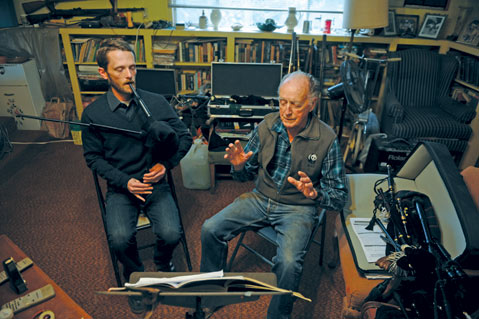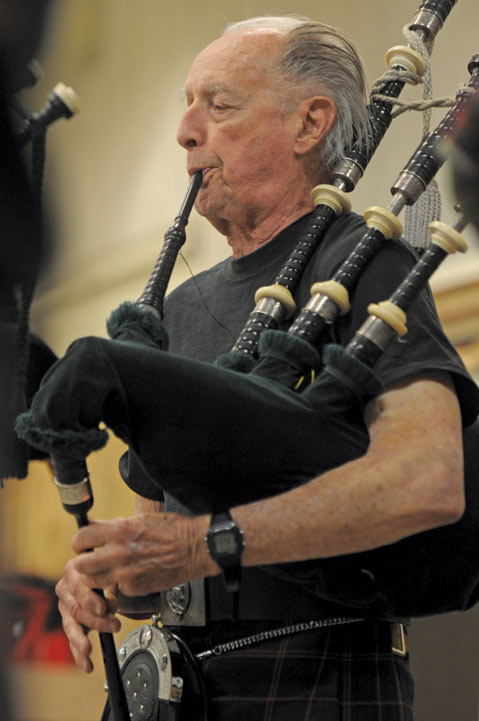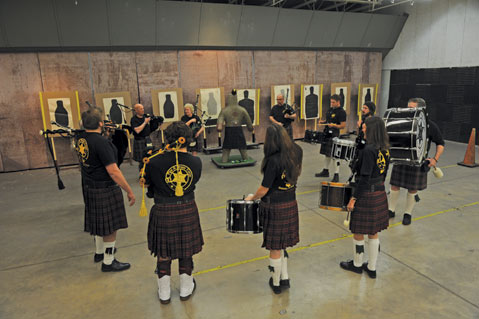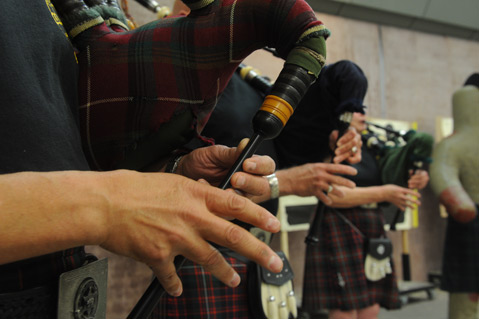Disturbing the Peace
Making a Joyful Noise with Pipe and Drum Corps

Revisionist historians have now ascertained there never were any snakes for St. Patrick to chase out of Ireland. But even if there had been, it’s likewise true that bagpipes had yet to make their way to the British Isles during his day. Thus, the bagpipes can in no way be blamed for the dearth of snakes on the Emerald Isle.
But traditions have never much cared for historical accuracy. As a result, St. Patrick’s Day is celebrated with music played on the great highland bagpipe, an instrument of war that’s now decidedly associated with the Scots.
Leading the charge down State Street for The Santa Barbara Independent’s 6th Annual St. Patrick’s Day Stroll will be the Santa Barbara Sheriff’s Pipe and Drum Corps, which has been joyfully “disturbing the peace” since its founding in 2007.
Serving as ground zero for this collection of seven pipers and six drummers is Bob Guthrie, who during the last 25 years has taught more Santa Barbarans how to play bagpipe than any 10 other instructors combined. Guthrie, now approaching his 90th birthday, credits his Scottish heritage with propelling his unique musical odyssey. But the Irish, he’s quick to acknowledge, have had their own bagpipes and robust piping tradition. The overlap between the two, he added, is vast. Putting it differently, Guthrie’s longtime musical co-conspirator, Tom Strelich, noted, “The joke is that the Irish gave the Scots the pipes as a joke, but that the Scots didn’t get that it was a joke.” Strelich was the first piper, with his wife, Allison, on snare drum, to lead the premier Indy Stroll in 2008.

Trim and fit with his hair whooshed back at the sides, Guthrie comes across in person as both tough and twinkly. In conversation, he’s given to unvarnished appraisals, blunt assessments, and intricate, detailed historical asides that span both the centuries and the decades. Strewn throughout the room where he teaches in his Mission Canyon home are countless bagpipes flopped over on their sides. Scores of antique rifles — or replicas he built himself — line the walls. A competitive shooter and a “black powder” buff, Guthrie is positively encyclopedic on the subject of warfare and weaponry.
That should come as little surprise. Guthrie was born in Leavenworth, Kansas, an army brat, whose father retired with the rank of colonel in the coast artillery — the only branch of the services never to have fired upon the enemy in battle. The family moved from base to base. “I didn’t grow up anywhere in particular,” Guthrie recalled. During World War II, he enlisted and saw serious action, flying 35 bombing missions over Europe. He had just been assigned to the South Pacific when the United States dropped two atom bombs and Japan surrendered. After the war, Guthrie went to college, worked as a border-patrol officer in Texas, and did a stint as a civilian contractor at Norton Air Force base in Riverside.
Guthrie then moved to Santa Barbara; his parents had relocated here in 1948. He did a little of everything — worked at a gas station, sold hi-fi systems, installed TV antennas, and dove for abalone. He became a sheriff’s deputy in the late 1950s and worked his way up to detective by the time he quit six years later. In 1965, Guthrie agreed to run for sheriff against the incumbent Jimmy Webster. But when it turned out he wasn’t the wild-eyed right-winger his backers had hoped, campaign donations dried up. Still, he managed to secure 15 percent of the vote.
Guthrie made wetsuits, which he marketed as “Deep Thought Wetsuits.” He bought Bob’s Diving Locker, where he trained scuba divers and sold scuba equipment. He sold the company in 1990.
In 1955, Guthrie and clan rented a place on Mountain Drive from Bobby Hyde, the infamously iconic bohemian, who was famous for his parties celebrating Scottish poet Robert Burns. Guthrie, who tinkled about on the piano as a child, would not begin his musical adventure with the bagpipes until 1960. As to why he was drawn to them, Guthrie is less than expansive. “I don’t know. Why does anyone start anything they do?” he posed.
One morning, he recalled, the sound of pipes came washing in from across the canyon. The player, it turned out, was a family acquaintance and a quartermaster in the pipe corps then sponsored by the 7 Up bottling company headquartered in Carpinteria at that time. Bankrolling the corps — the cost of kilts and other essential accessories quickly adds up — was Walter B. Truman. Guthrie quickly became sucked in. “We had 25 pipers in that band,” he recalled. “Not one was competition grade. Mostly, we just wanted to wear the fancy outfits and parade around a lot.” Guthrie is mostly self-taught; he learned by making mistakes. “It took me years to get things right,” he said. “I know how to do things wrong, so I can tell when someone else is, too.”

The Pipes Are Calling
In many ways, the bagpipe is the polar opposite of the ukulele. Nobody just picks one up and plays a few recognizable tunes with the effortless ease offered by the uke. Playing the bagpipes is about as simple as sticking a live goose under one’s arm and squeezing while simultaneously tweaking the goose’s bill to elicit different pitches and tones. For beginning students, the bagpipes are all about deferred gratification and hard work.
At a recent band rehearsal held at the sheriff’s shooting range, Strelich — a volunteer pilot on the sheriff’s aviation wing — likened the sound of the bagpipe to that of “four duck calls.” That’s because bagpipes produce not just one note but a choir of four notes played simultaneously at all times, which, combined with their pitch and squeal, accounts for the astonishing size of their penetrating sound.
Three of the four pipes on a great highland bagpipe play drone notes. One plays a low “A” and the other two play the same note, just an octave higher. The melody is played on another pipe known as the “chanter,” a double-reed instrument that sort of resembles a recorder. Players don’t blow directly into the chanter as they might into other double-reed instruments like an oboe or bassoon. Instead, they blow air through the pipe in their mouths into a big bag then squeeze the bag to push the air through the reeds. A big challenge is keeping the bag filled to a constant pressure even while squeezing. With too little or too much air, the chanter goes silent.
As if that weren’t difficult enough, the bagpipes are capable of playing only nine notes and in a key that no longer exists anywhere else on the musical planet. Likewise, those nine notes do not conform to the same nine notes of the same names as played on any other instrument. Bagpipes can’t be played softly or loudly; the volume remains the same. And with the flow of air being constant, there can be no rests, no breaks in the sound. To the extent control is exerted, it’s through the fingering of the notes. Any piper worth his or her salt has mastered any number of different grace notes that depend upon an unforgiving precise execution to succeed.
Guthrie suggested the bagpipe — in its pre-bag form — originated somewhere in the Middle East, probably around Afghanistan, many millennia ago, where it was used by shepherds to while away the hours. After a few thousands years, some nameless player got the inspiration to yank a bladder from the carcass of a dead sheep, using it as a surrogate set of lungs. This innovation caught on and was spread throughout much of the globe by Roman soldiers in their march toward empire. The last place the pipes landed, Guthrie said, was the British Isles, where they were further modified.
With their screeching penetrating sound, the bagpipes were ideally suited for warfare. According to one dictum, to demoralize one’s enemy, you killed their piper. After a major battle in 1745 between Scottish insurgents against the British crown, four Scottish rebels were charged with taking up arms against the crown. One of the accused protested he was only a bagpipe player. But as legend has it, the judge found the pipes an “instrument of war” and ordered the piper hanged.
When Scottish troops landed for the Invasion of Normandy during WWII, they were led by a piper, who marched and played along the beach as bullets flew. The Germans reportedly didn’t shoot the piper — who died just recently — because they thought he was crazy.

Leading the Charge
At some point, it fell to Guthrie to impose order on the sprawling musical din of the 7 Up piper band. He agreed to take over as major, but only if his fellow pipers agreed to learn to play the songs properly. His first step — much resisted at first — was to bring a big metronome to practices. “Finally, I got my point across that we should play according to the actual beat,” he said. He and his fellow pipers improved and continued playing weddings, funerals, birthdays, parades, and of course, Bobby Burns celebrations.
When Walter B. Truman, the 7 Up band benefactor, died, it fell increasingly to Guthrie to provide the organizational nucleus. He filled the void by teaching new pipers, always with an eye toward recruitment. In 2003, the first question he asked Twila Goodrick, whose Scottish heritage inspired her to learn to play the bagpipes after her husband died, was how old she was. “He didn’t want to teach an old dog new tricks,” she explained. Recently retired, Goodrick compensated for her relatively advanced years with musical experience. She’d played bassoon in high school, sang alto in a church choir, and knew how to read music. She progressed much faster than Guthrie expected, and today is the only woman to play the pipes in the band.
Strelich — who has no Scottish or Irish roots — took up the great highland pipes after giving up all hope that one day his kids might be so inclined. Goodrick and Strelich, along with a few other pipers, helped provide the core for a pipe and drum corps that’s operated under Guthrie’s tutelage since 2007 within the auspices of the Sheriff’s Department. Guthrie said he’d approached the Sheriff’s Department many moons ago but with no success. But when Strelich approached Sheriff Bill Brown, they got not only the green light but also space to practice at the shooting range. Certainly, it’s helped that former jail commander Jeff Banks, who just retired, is part of the effort.
The main thing about piping, said Goodrick and Strelich, is the fun and camaraderie. “It’s fun to march in the parades, go into the pubs, and play for peas and pies,” Goodrick said. Unlike many pipers, Goodrick knows how to harmonize and play duets. And she’s gone to piping festivals in Scotland where 1,000 pipers marched onto the field. She also has at her fingertips at least six ready responses to the age-old question of what’s worn under a kilt. Quoting Guthrie, she said, “Nothing’s worn; everything’s in perfect working order.” Other answers include, “What God gave me,” “Shoes and socks,” or “On a good day, lipstick.”
Strelich said he plays weddings and funerals. Though traditional Celtic tunes dominate the repertoire, all is not “Amazing Grace.” For solstice one year, the crew learned how to play “The Lion Sleeps Tonight,” though last-minute complications kept them out of the parade. During Fiesta, the band does the pub crawl, playing tunes like “La Cucaracha.” This St. Patrick’s day, they’ll be in full flower.
While many players are middle-aged or older, younger musicians are both welcome and encouraged. For example, a 16-year-old Dos Pueblos High School student named Moon Man Whitehead joined the band last fall and has already established a reputation as a musical prodigy. Whitehead also plays viola and cello but was drawn to the instrument’s big-voiced drone. “I just thought it sounded cool,” he said. Guthrie, he said, was a very good teacher, but very strict. “He really cracks the whip,” Whitehead said. “He doesn’t cut you any slack.”
Whitehead said he practices an hour a day, but he has to play outside for fear of disturbing the peace in the Ellwood apartments where his family resides. “At least the joggers enjoy it,” he said. Whitehead claims no Scottish or Irish heritage. In fact, he’s a Native American of Cherokee descent. “There was no one out here playing the pipes,” he explained. “I thought, ‘Why don’t I be that guy who plays the bagpipes?’”
• The Call of Home: Two Years Discovering Irish Roots on the Family Farm in Dingle
• Dublin DVDs: Three-DVD Collection Delves into the Heart of Dublin
• St. Paddy’s Bus Crawl: Jump On the School Bus for a Day of Drink
• Our Irish Sister: The Town of Dingle is Santa Barbara’s Sister City



